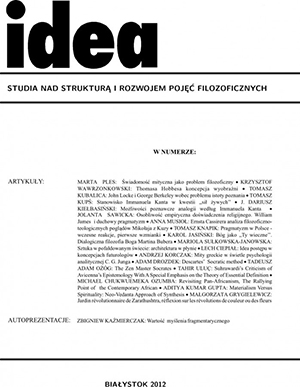Ernst Cassirer i Nelson Goodman: konstruktywna siła symbolizacji kulturowych
Ernst Cassirer and Nelson Goodman: Constructive power of cultural symbolisations
Author(s): Józef TarnowskiSubject(s): Semiotics / Semiology, Epistemology, Philosophy of Language
Published by: Wydawnictwo Uniwersytetu w Białymstoku
Keywords: categorisation; denotation; exemplification; expression; symbol; symbolisation; meaning;
Summary/Abstract: According to Ernst Cassirer’s views expressed in Philosophy of Symbolic Forms and Essay on Man a man is ‘a symbolic animal’, which means that: /1/ every meaning is symbolic, /2/ symbolisation creates the world but it does not reflect it, /3/ symbolisations are not individual but cultural, /4/ culture consists of ‘symbolic forms’, i.e., science, common sense, religion, magic, language and art, which create the world in different ways. Nelson Goodman in Languages of Art and Ways of Worldmaking developed Cassirer’s view towards more radical epistemological pluralism and changed his semiotic assumption. Cassirer accepted Frege’s understanding of symbolisation as a relation between three elements: a symbol, its meaning and a denoted object. For Goodman symbolisation is a two-element relation: between a symbol and an object, without the category of meaning. Symbols can denote or exemplify or refer to objects in complex and indirect ways. The paper aims to address the problem of the efficiency of that categorisation.
Journal: Idea. Studia nad strukturą i rozwojem pojęć filozoficznych
- Issue Year: 2/2016
- Issue No: XXVIII
- Page Range: 52-63
- Page Count: 12
- Language: Polish

